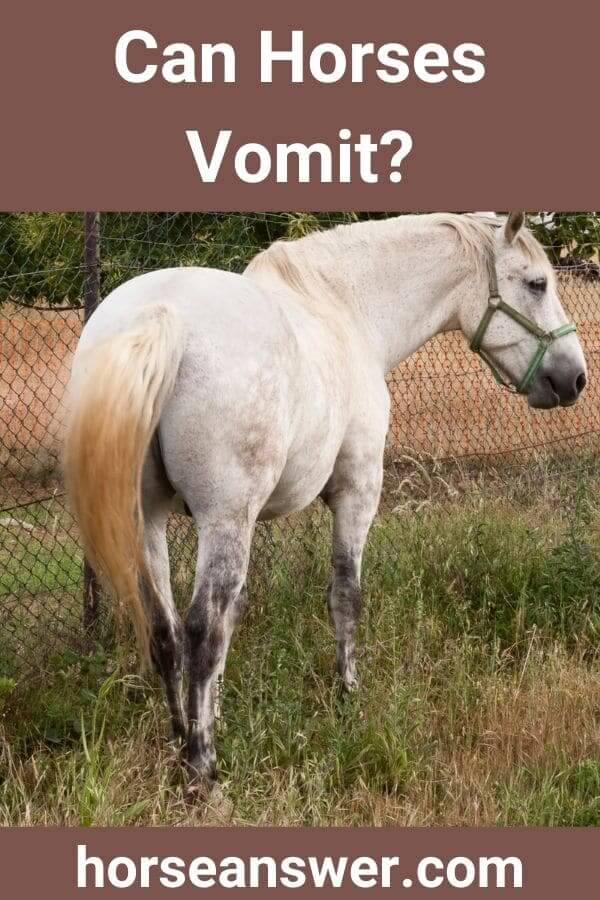Can Horses Vomit? (Find Out!)
I was out walking through my horse’s field with a friend the other day when he saw one of my horses making an odd face, and asked me if something was wrong.
I said no, he does this all the time, he’s just a bit strange.
But then my friend said that he’d thought the horse was going to vomit.
This got me thinking, as I’d never actually seen my horse or any horse vomit.
I began wondering if they were even able to do and if so, why it was so rare.
So, I decided to look into the question.
So, can horses vomit?
No, it is virtually impossible for horses to vomit due to their anatomy. Unlike most vertebrates, horses’ esophageal sphincters are almost totally resistant to opening backwards due to pressure from the stomach. Further, the esophagus joins with the stomach at a very low angle.
So, it’s essentially an anatomical impossibility. Horses’ bodies don’t allow them to throw up.
They have other mechanisms for dealing with what other animals would solve through vomiting.
So, let’s look in a bit more detail about what this means.
Why can’t horses vomit?
So, to start with, unlike us, a horse’s esophagus joins the stomach at a very low angle, from the side.
Ours joins from directly above, making it much easier to build the pressure directly below the esophagus necessary to vomit.
This is one of the most obvious differences explaining why horses can’t vomit, as this does make it much harder.
However, there are plenty of quadrupedal animals whose stomachs and esophagus join at a similar angle who are perfectly capable of vomiting.
Cats, for example, of all sizes, vomit habitually.
So, the main factor which prevents horses from vomiting is this incredibly strong esophageal sphincter.
The sphincter is what regulates what you’re swallowing, stopping food from just flowing down your mouth as you’re eating.
In ours, it does the job, but it’s more than weak enough to allow food to come back the other way if we need to vomit.
In horses, this isn’t the case.
A horse’s esophageal sphincter is so strong that it simply won’t open under backward pressure from the stomach.
Horses have a strong band of muscle around the esophagus essentially preventing this from happening.
In a lot of ways, it makes more sense, since when a horse gallops, its intestines shift around inside it like a piston.
This would cause any other animal to throw up, but horses have evolved the physiology to balance all this out.
Horses vomiting is not completely unheard of, however.
But it usually indicates something very serious.
So let’s look at what can happen in that situation.
What happens if a horse vomits?
The first thing you should be aware of is that I’ve known many overly cautious horse owners who saw a piece of food fall out of their horse’s mouth and began worrying they were vomiting.
One thing horses will often do is chew food for a long time, and sometimes allow it to just fall out of their mouth eventually.
Also, they are quite prone to minor bouts of choking, and can often just let the food fall out to the ground.
So, before you start panicking, make sure this isn’t all that’s happening.
On the other hand, if your horse brings up a lot of matter and seems to be in great pain, it may be vomiting.
If your horse does vomit, it’s a good indication that its stomach has ruptured.
Under normal circumstances, horses simply can’t vomit, so if they do, it indicates something very serious.
Realistically, the only way it can be done is if something has caused the esophageal valve to forcefully open.
This is still extremely rare, and there’s usually one or two causes for it.
Overfeeding is one of the main offenders, and rupturing usually occurs due to overfilling and obstructions in the stomach.
So, the most important thing you can do to make sure your horse doesn’t vomit is get them the best diet possible and don’t overfeed them.
Horses are also prone to heavy gas from overfeeding and digestion, and this can be another cause, though only in extreme cases.
Your horse would have to eat a great deal of something it wasn’t supposed to eat.
So, just be careful of what your horse eats, and it shouldn’t have a problem.
What to do if a horse vomits?
If your horse does vomit, and you’re sure it has actually vomited, the best thing you can do is immediately call a vet to come out.
There’s very little else you can do for the animal at that point, as a ruptured stomach is very serious.
Don’t panic, though, and call a vet immediately, and your horse may still be able to be saved.
So, vomiting in horses is pretty much impossible except for very, very serious cases.
If you do see your horse vomiting, there’s a couple of things it could mean, and you should first try and be sure that it hasn’t just spat something out of its mouth.
In any case, if your horse does vomit, you should contact a veterinarian immediately.
Most of the time, however, you’ll never have to worry about cleaning up your horse’s vomit.
